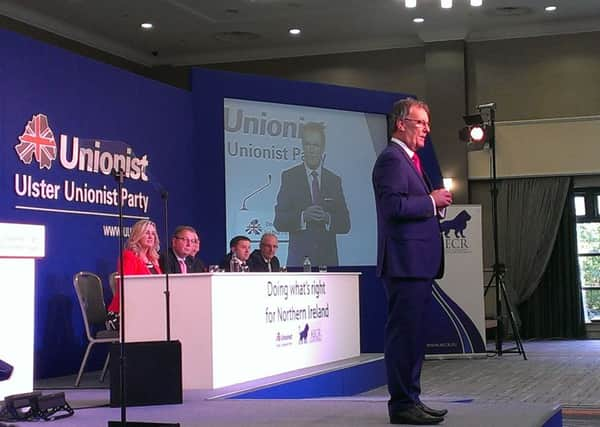Wright ponderslack of officialopposition andtalks prospects


In 2012, John McCallister MLA contested the leadership of the UUP on a platform of taking the party into Opposition and relinquishing its Executive position.
Whilst not agreeing with him on the latter there were members who felt that such was the state of affairs within the NI Assembly that going into Opposition was an imperative.
Advertisement
Hide AdAdvertisement
Hide AdNot everyone who felt this way supported John McCallister’s candidature. Many preferred Mike Nesbitt MLA as leader. He, for his part, alluded to taking the party into Opposition at some time in the future and, if elected, to putting a group in place to look at the options. If this occurred it seems to have been well below the radar and leaving the Executive was always unlikely. Others, MLAs included, convinced by the argument could not bring themselves to be decisive as to timing. Underlying party loyalty and disciplinary issues often displayed in public also influenced the outcome.
Hindsight is a wonderful teacher but there can be little doubt that in the light of events the failure to argue for Opposition and fundamental review more energetically has proven to be an exercise in self –deception of which more than the UUP has been guilty. Convictions only now being voiced more strongly failed to prompt significant action.
The electorate should be grateful that John McCallister, in contrast to the erudite but volatile arguments voiced by Jim Allister MLA and in spite of the NI21 collapse has remained resolute in working for structural and operational review at Stormont.
We are led to believe that in the talks, inexplicably only involving the Executive parties, which have begun that review will be on the Agenda and Theresa Villiers the Secretary of State recently voiced her support for Opposition at Stormont subject to the necessary support.
Advertisement
Hide AdAdvertisement
Hide AdWhilst the First Minister has intimated that Stormont is not fit for purpose how realistic is it that the two biggest parties will endorse change? Their decisions and policies are always indicative of strategies in line with their historical and pre-Agreement prejudices and beliefs. Their actions have been driven by their willingness, admittedly now under strain, to tolerate and mutually- benefit each other. They squeeze out any alternative.
How likely are they to agree change that does not secure a status quo that, if left unchallenged, will continue to condemn the electorate to the corrosive tyranny of their self-interest and enjoyment of power?
Is it time for the governments in London, Dublin and Washington who played pivotal roles in establishing the structures to cease the role of indulgent referee and adopt a more robust approach to initiating change.
Without this, it is entirely likely that the main participants will continue along routes mapped by their interests and poor judgement.
Terry Wright
Londonderry
October 20, 2014.